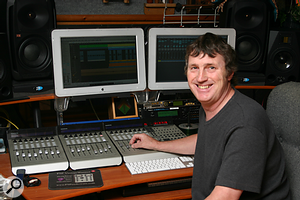Just after we finished the last issue of Sound On Sound news came in that Yamaha had purchased Steinberg from Pinnacle Systems. We knew that two or three companies were interested in buying Steinberg, Yamaha being one of them, but we weren't sure who would get it until the news arrived.
Some people may find it strange that a company like Yamaha, who are predominantly in the business of building hardware, would want a mainstream sequencer (specifically Cubase and Nuendo), but anyone who has looked closely at the company will recognise that Yamaha were one of the first hardware manufacturers to treat software as a potential ally rather than a threat. After all, they were amongst the first of the large music companies to build soundcards with serious synths and mixers on board.
Yamaha have also developed a number of pieces of music software themselves, as well as creating the singing synthesis engine behind the Vocaloid project. They have editors for their mixers and their 01X interface, they have software plug-ins for some of their hardware and they have their own suite of really rather good native plug-ins that ship with the 01X but are also available separately for purchase. Yamaha, as you may remember, are also the company behind mLAN, a technology that allows hardware and computer-based audio systems to stream MIDI and audio data to each other. The company have also offered encouragement to third-party developers by releasing the Software Development Kit (SDK) for their Studio Connections protocol, and while Yamaha-generated standards haven't always taken off in the mainstream market quite as quickly as they might have liked, at least they are making the effort.
Of course the real question is, what does this acquistion mean for you, the Cubase or Nuendo user, in terms of future development and support? At this early time we've had little official comment so we can't say anything definitive, but personally I don't think Yamaha would buy a company like Steinberg if they weren't going to get behind it and develop it further, especially given the co-operative relationship that already exists between the two of them.
There's always a worry that when a large corporation buys a smaller software company they will either strip it for assets or make radical changes the users might not like, as Apple did when they bought Emagic and subsequently dropped support for the PC version of Logic. I'd be very surprised if anything like that happens here, as Yamaha have the vision to see that the future of studio hardware depends on how well it can be made to work in a predominantly software environment. I'd expect further development of the Studio Connections initiative and for mLAN support to be improved, in part to help strengthen the format and further expand its user base, but I honestly can't say that I foresee anything sinister.
We've often discussed the implications of software piracy on the industry, and sadly, our predictions are coming true rather sooner than we expected. Despite what many people might think, Steinberg are a small company, especially when compared to the likes of Adobe or Symantec, and their history over the last few years goes to show how vulnerable companies of this size can be. If small software developers are not allowed to make a living, they either go to the wall or get bought up, and once they are out of the hands of the enthusiasts who created them, there's no way to know which way they will go.
Personally I'm optimistic that Yamaha will prove to be a very good home for Steinberg, but only time will tell what their intentions are. As soon as we get official word, we'll let you know, but in the meantime we can only sit back and speculate like everyone else!
Paul White Editor In Chief
